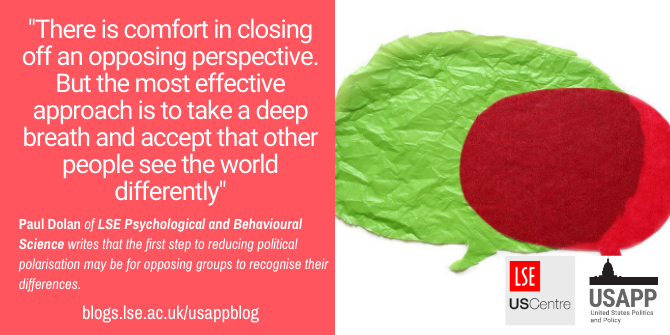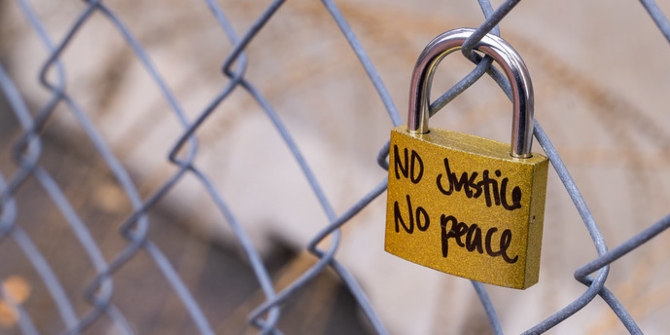 Donald Trump’s four years in power further polarised the American electorate with little common ground now apparent between Republicans and Democrats. As part of our new Building Back Better series, Paul Dolan looks at how those on opposing sides of the political spectrum can start to come together – beginning with the recognition of the other side’s views and creating space for debate.
Donald Trump’s four years in power further polarised the American electorate with little common ground now apparent between Republicans and Democrats. As part of our new Building Back Better series, Paul Dolan looks at how those on opposing sides of the political spectrum can start to come together – beginning with the recognition of the other side’s views and creating space for debate.
The rolling news coverage from Washington DC over the past several months has demonstrated that President Biden and his team have an uphill task: they have to rebuild before they can fulfil their campaign slogan, ‘Build Back Better’. We know from the vast literature on social capital, dating back at least to the work of Robert Putnam, that individuals and societies are better off not just when they have “bonding” social capital within a group but when there is “bridging” across groups. So how does any politician start bridging factions that have become so separate and entrenched in the rightness of their own views?
If we believe in the democratic process, then we must accept that our preferred narrative will not always win, no matter how convincing we consider our case to be. Living in a democracy means that we are likely to be exposed to different perspectives – some of which we may not agree with. The nature of the political system is that it thrives on highlighting differences and division, not similarities and coalition. We choose a side and support a narrative on an issue, and then pride ourselves on our consistency by sticking to that belief. We don’t like feeling conflicted; changing our minds requires effort and our brains are lazy. We therefore have very little psychological or social incentive to change our mind about anything once it has been made up.
In politics, different sides rarely accept that there might be elements of the others’ narrative that might more accurately reflect some “truth” about the world. To be clear, this is not to say that we must be accepting of all arguments and elements of opposing views. The storming of the US Capitol by armed insurrectionists on January 6th was simply unacceptable, for example, not least because it broke the law and aimed to foment violence. There are not always two legitimate sides to every argument, especially when a group on one side would seek to deny the basic human rights of those on the other. But, at the same time, we must not fall into the trap of seeing the extreme face of an alternative view (or one side of the political spectrum) as representative of it.
In the corporate world, executives pride themselves on pulling together diverse perspectives – or, at least, that is the intention. But it is only possible to consider competing narratives together if a significantly large number of us show some humility and a willingness to be circumspect about the rightness of our preferred narrative. We must also be willing to change our minds, collectively at least, when better evidence becomes available.
The first step to bringing factions in society together is acceptance. To understand why we act and feel in the ways we do, and to change those behaviours and emotions, we must first accept who we are and our actions, thoughts and feelings. In a similar way, in order to understand the role of polarising narratives on policy decisions and the degree of support for them, we must accept their potential influence on our own behaviour.

“Romain Gérard : Speech balloons” by Marc Wathieu is licensed under CC BY NC 2.0.
We must also accept that we dislike dissenting views. Instinctively, we want to be around people who share our views. We like people who are like us. This makes the formation of echo chambers a very natural phenomenon. Like most behavioural phenomena, they have only been magnified by social media, not created by it.
There is comfort in closing off an opposing perspective. But the most effective approach is to take a deep breath and accept that other people see the world differently. We must allow ourselves time to reflect before we react. One way that people could be more likely to have more constructive conversations online rather than simply posting immediate reactions would be to set a few seconds delay on their posts and ask for confirmation that they want to send.
There must be opportunity for a debate in the first place with those in groups who have different views, but who also share a commitment to democratic norms and equality and human rights, and this requires us to accept that issues are worth debating rather than seeking to insult or simply ignore those who disagree with us. Whilst extreme views often dominate news coverage, there is a lot that unites most of the people who voted for Biden or for Trump in the recent US election. Most people want to reduce the harms caused by COVID-19 and the various policy responses, to have good quality jobs, and access to affordable healthcare. These can be some of the building blocks for building back better.
- This article is part of our Building Back Better series, which looks at how the Biden Administration is tackling issues across US governance, economics, politics, culture, and society. Read more articles in this series.
Please read our comments policy before commenting
Note: This article gives the views of the author, and not the position of USAPP– American Politics and Policy, nor of the London School of Economics.
Shortened URL for this post: https://bit.ly/3fnrEoZ
About the author
 Paul Dolan – LSE Psychological and Behavioural Science
Paul Dolan – LSE Psychological and Behavioural Science
Paul Dolan is Professor of Behavioural Science at London School of Economics. You can read more of his work at www.pauldolan.co.uk.






